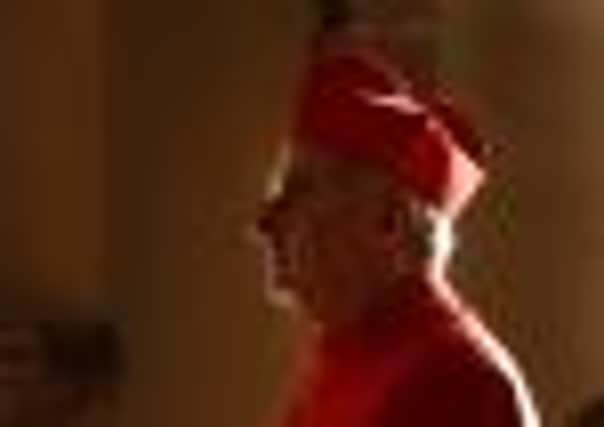Ian Swanson: Catholic Church in Scotland has reached crisis point


Cardinal Keith O’Brien spoke out loud and clear against gay marriage, branding it an “aberration” which would lead society “further into immorality” – but has now admitted his own sexual conduct “fell short” of what was expected of him.
The allegations from three priests and one former priest of inappropriate behaviour back in the 1980s shocked the faithful. His resignation the following day as Archbishop of St Andrews and Edinburgh made headlines around the world. And his confession earlier this week of sexual misconduct confirmed the scandal.
Advertisement
Hide AdAdvertisement
Hide AdIt could hardly have come at a more embarrassing time, with cardinals gathering in Rome to choose a new Pope. But what does it mean for the Catholic Church in Scotland?
The blatant contradiction between Cardinal O’Brien’s outspoken public statements and what he has now admitted about his private behaviour makes the charge of hypocrisy undeniable. The fact he held such an elevated position in the church means the institution itself is compromised.
Political parties and other organisations have their share of sex scandals and shrug them off, but it’s not so easy for the Catholic Church to blame one “bad apple” and carry on regardless. This is a body which has not only made telling people how they should behave part of its mission, but also claims divine authority for doing so.
Archbishop of Glasgow Philip Tartaglia, who has been appointed as temporary replacement for Cardinal O’Brien, has admitted bluntly that “the credibility and moral authority of the Catholic Church in Scotland has been dealt a serious blow”. It is difficult to see how bishops and priests could now be taken seriously if they speak out publicly to denounce homosexual activity or same-sex marriage. Will the church take a more sympathetic view now? Can it claim any authority to speak on any other issues?
One Catholic insider says: “The church won’t change its teaching, but it will need to look at how it engages with people and perhaps it will take time to be more selective in what it speaks about.”
But he says that won’t mean steering clear of sex and marriage. “The church has to speak the truth and marriage and family life is a social issue. It still needs to say what it’s got to say. It’s more about how it does it.”
Along with other denominations in Scotland, the Catholic church has seen its numbers decline over recent years. At the time of the Pope’s visit to Scotland in 2010, figures showed the Catholic population had fallen by 18 per cent since 1982, baptisms were down 39 per cent and the number of people marrying in Catholic churches had plunged by 63 per cent. But one priest says he does not expect a sudden flight from the pews because of the scandal. “It’s difficult to know how it will be reflected in attendances. Some parishes say their numbers have gone up since the news. There’s maybe an element of just wanting to show you’re not going to be beaten down.”
Cardinal O’Brien’s dramatic downfall comes on top of the more serious scandal of paedophile priests which has so tarnished the image of the worldwide Catholic Church. The appalling nature of such abuse and the failure to deal with it satisfactorily has permanently changed many people’s perceptions of the church.
Advertisement
Hide AdAdvertisement
Hide AdIn his early days as archbishop, Cardinal O’Brien took a notably liberal approach and even after he had been named cardinal he acknowledged gay clergy were a fact of life in the church. “If ten per cent of men are gay then it’s a reasonable assumption that ten per cent of priests and ten per cent of bishops are gay, but it is what you do about it. If they are living a celibate life then God bless the men.”
His move from a liberal attitude to the hardline stance for which he became famous remains puzzling. Some claim there was no change in his underlying views, but that after becoming a cardinal he was obliged to proclaim the church’s official position. Nevertheless, the vehemence of his comments made it difficult to detect any reluctance or reservations. One church insider says: “He felt that unless he spoke out fairly strongly on something, people would ignore you.”
Archbishop Tartaglia is overseeing the St Andrews and Edinburgh archdiocese until a permanent replacement is appointed. A church insider says that could take as long as a year. “It’s quite a long process and it won’t get started for a wee while because of electing a new Pope.”
And there is the longer term question of whether Scotland can ever expect to get another cardinal.
O’Brien was only the third cardinal in Scotland since the Reformation. His predecessor in Edinburgh, Cardinal Gordon Gray, was the first in 1969 and Glasgow’s Tom Winning followed in 1994.
When he was appointed in 2003, Cardinal O’Brien pointed out there were many larger countries which did not have a cardinal. “It gives an indication of how Scotland is regarded by the Catholic Church throughout the world,” he said at the time. That regard might no longer be quite so positive.
Senior figures ‘will be uneasy’
KEITH O’Brien
will not be the only
Catholic leader living
with a secret, according
to the journalist behind
the original story about the
claims of “inappropriate behaviour”.
Catherine Deveney says: “There is a danger that this reaches a new level of hypocrisy for the Catholic Church – the suggestion that this is just one aberrant cardinal and we are all shocked by Cardinal Keith O’Brien of Scotland.
“I don’t think anyone would be naive enough to think that Keith O’Brien is the only
senior figure in the
Catholic Church in this position. There will be
a lot of senior figures
who are very
uneasy now.”